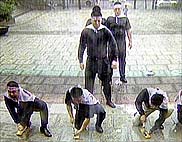

August 14, 2001
Koreans Slice Their Fingers in Anti-Japan Rite
By DON KIRK
|
|
|
 EOUL, South Korea, Aug. 13 — Twenty young Korean protesters chopped off the tips of their little fingers today while shouting, "Apologize, apologize!" for offenses they said the Japanese had committed against the Korean people. The protesters, dressed in black, lined up in a drenching rain in front of the Independence Gate, once a prison that held independence fighters during Japanese colonial rule of Korea.
EOUL, South Korea, Aug. 13 — Twenty young Korean protesters chopped off the tips of their little fingers today while shouting, "Apologize, apologize!" for offenses they said the Japanese had committed against the Korean people. The protesters, dressed in black, lined up in a drenching rain in front of the Independence Gate, once a prison that held independence fighters during Japanese colonial rule of Korea.
The ritualistic display reflected their rage over the planned visit by Prime Minister Junichiro Koizumi of Japan to a shrine honoring Japan's war dead. The protesters borrowed their ritual from Korean gangsters, who have been known to cut off their fingers to show their loyalty to their boss. In this case, it apparently demonstrated the protesters' loyalty to their country.
Many people, both Koreans and Japanese, have been outraged by the shrine visit, seeing it as a sign of Japan's insensitivity and lack of repentance for it past aggression in northeast Asia. One of the protesters, wielding a microphone, led the group in denunciations of Mr. Koizumi's plan to go to the shrine as well as his refusal to order revisions of middle-school textbooks that Korea has officially criticized for glossing over Japanese colonialism and militarism in northeast Asia.
"We are against the shrine visit, we are against the textbooks," the protesters chanted while slicing their little fingers with heavy knives, then bandaging them with pieces of the Korean flag before one of them gathered the tips in another flag and folded it in front of the group.
A videotape by Yonhap TV, a 24- hour cable network, shows members of the group swinging Korean flags and banners proclaiming themselves the "Save the Nation" organization. They said they had come to Seoul after visiting a war memorial in Chonan, a town about 60 miles to the south. The police, caught by surprise, made no attempt to stop them.
The image on television dramatized the formal words issued later by the Korean Foreign Ministry after Mr. Koizumi was shown on all four Korean TV networks entering the shrine. The ministry said the Korean government "deeply regrets" the visit to the shrine, which it called "a symbol of past Japanese militarism." Officials reminded Japan that the government had warned of the adverse consequences of the visit on Korean public opinion and Korean-Japanese relations. If Mr. Koizumi were "willing to cultivate genuine friendship and cooperation," said the statement, "he should respect the positions and national sentiments of the countries concerned based on a correct understanding of history."
Elderly women who had been forced to work as "comfort women" for Japanese soldiers during World War II staged a separate demonstration. "They are really bad people," said one of the women, shown on Yonhap TV after the scene of the finger-cutting. "They are all bad."
